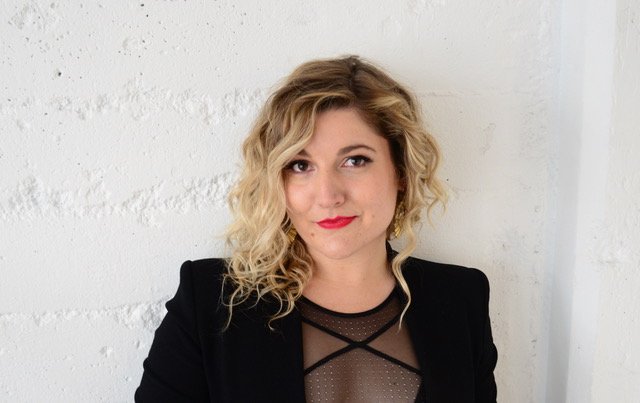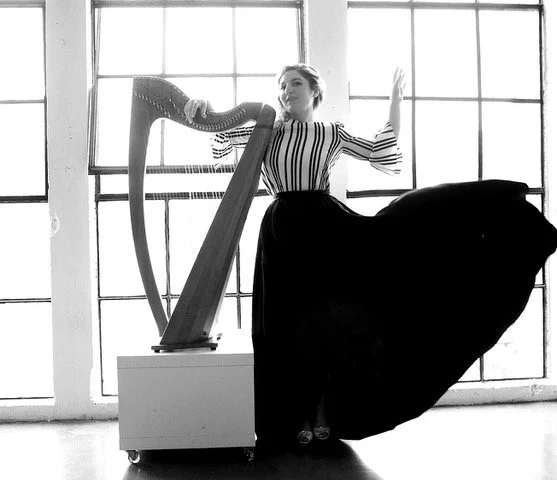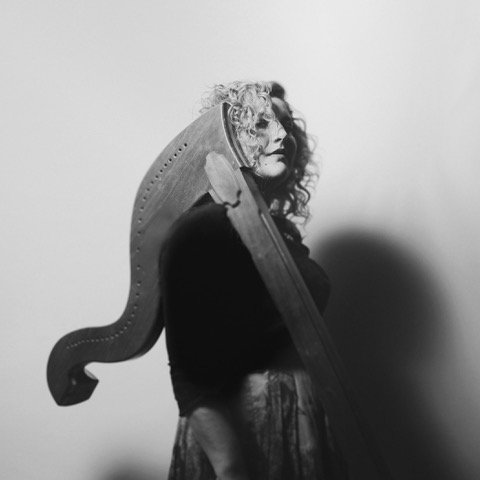GILLIAN GRASSIE > Creative Director
Harpist, singer-songwriter, television writer, and producer
FROM | Philadelphia.
WORK | I’m a harpist, singer-songwriter, television writer, and producer.
HOBBIES | Argentinian tango, baking, and running with my Pitbull rescue, Liadain.
RECENT BOOK | The Overstory by Richard Powers.
FAVORITE FOOD FROM SWITZERLAND | Yogurt.
FAVORITE SPOT IN SWITZERLAND | Somewhere high enough in Lausanne to see the weather coming across the lake from Evian.
What is your first memory of playing your instrument, and how did you get interested in that particular instrument?
I don’t remember the first time I saw or heard a harp, but I started asking for lessons when I was really little – maybe three or four years old. My parents tried to get me to study guitar or piano, but I was a terrible student, never practiced. When I finally got my first harp lesson around twelve, I fell in love immediately. It’s not that I didn’t have to work hard, but there was a comfort with the harp I’d never felt with other instruments. My hands had always felt awkward and clumsy forming chords on the guitar or pressing down on piano keys, but when I put my hands on the harp… it just felt right.
What did you study and where?
I studied harp privately (with a wonderful local Curtis Institute alumna, Janet Witman), but what I really wanted to do when I finished high school was enter a jazz harp program, and there just weren’t a lot of options back then. Instead of pursuing a classical conservatory degree, I decided to study Comparative Literature and Creative Writing at Bryn Mawr College.
That decision served me well both as a songwriter and later in other storytelling formats. I’ve ghostwritten two memoirs and recently landed my first job as a television writer for a new show on a major streaming platform! (I’d love to tell you all about it, but they made us sign NDAs.) Graduating from Bryn Mawr also made me eligible to apply for a Thomas J. Watson Fellowship, which led to me traveling through Europe and Asia with my harp as a Watson Fellow from 2009-2010, which led to two tours for the US State Department in Russia and South America, and ultimately several wonderful years as a touring artist based in Berlin. Sometimes the best things come from not getting what you think you want.
How did you handle mistakes and road blocks when beginning your musical career?
I think when I was younger, I sometimes made the mistake of feeling offended when someone would make a professional request that I felt was really unreasonable. It’s tricky because 1) it’s difficult to make a living as a musician so there’s a lot of pressure to agree to everything or risk losing business you can’t afford to lose and 2) there IS such a pervasive devaluation of music as “real work” in society, and that can take a toll on your spirit and make you defensive over time. Sometimes there is something genuinely predatory and gross at play. But far more often, those types of requests are coming from a place of really not understanding enough about what you do to even realize it’s a big ask.
I had to shift my thinking from “this person is asking something unbelievable of me for the amount of time I have to prepare and the amount of money they’re paying me – how DARE they?!” to “what problem is this person actually trying to solve with this insane request and is there a simpler way I can address that issue for them where we all end up happy?” It took a long time to figure out how to give people what they want rather than what they’re asking. Still, sometimes you just can’t honor a request and learning how to get off your soap box and just say, “I’m sorry, I can’t do that,” without being a jerk is surprisingly difficult.
How has your Swiss culture impact your life today?
I had the very good fortune of attending several years of summer camps run by the Foundation for Young Swiss Abroad (FYSA), which instilled an early appreciation for both Swiss culture and the breathtaking Swiss landscape. My experiences at Swiss Camp also gave me an immense amount of confidence in traveling independently and interacting with people from all over the world. These early experiences made major opportunities I had later in life – like performing at the Edinburgh International Harp Festival, applying for the Watson Fellowship, touring, and eventually moving abroad – feel exciting rather than scary.
I also spent a semester at a school in Lausanne when I was fifteen to learn French. (As a result, I still struggle a bit with numbers when in France – septante, huitante, nonante are so much simpler!) I brought my harp with me and wrote my first song during that semester in Lausanne.
More broadly, I think my Swiss heritage shaped my work ethic. Taking pride in your work and making an effort to do a job well – whatever it is – is a value shared by my whole family.
Who are some of your favorite musicians that inspired you?
I’ve been inspired by so many musicians, for so many different reasons: Billie Holiday, Björk, Patty Griffin, Portishead, Sam Cooke, Anaïs Mitchell, The Indigo Girls, Nat King Cole, Catriona McKay, Kate Campbell, Debussy, The Mills Brothers, Park Stickney… the list goes on. However, if I had to pick a single artist who’s had the greatest influence on me, without question it’d be Joni Mitchell. My father played her album “Court and Spark” on vinyl for me when I was a kid and it’s what made me want to become a singer-songwriter. There are so many layers and so much nuance in every element of her songs – the lyrics, the melodies, the harmonic choices, her vocal choices… To be able to do all that, on all those levels simultaneously, and have the sum result of all that complexity still be emotional rather than just cerebral… I was (and still am) just in awe. Joni made me fall in love with the art form.
What made you chose Philadelphia in your career?
Philadelphia is a pretty ideal city to get a fledgling music career off the ground.
It has vibrant local scenes in just about every genre, world-class musicians and music programs, and a rich musical history, so if your ears are open there’s so much available to you just through osmosis. You’ve got a massively influential non-commercial radio station, WXPN, that puts a lot of effort into promoting local music. You’ve got the Philadelphia Folk Festival, the Philadelphia Jazz Festival, the XPoNential Music Festival, the Philly Fringe Festival, the Philadelphia Orchestra, and venues as big as giant stadiums and as small as intimate listening rooms. Some of the best live music performances I’ve seen have been in Philadelphia.
Geographically, you’re within driving distance NYC, Washington D.C., Baltimore, Pittsburg, and even Boston, so putting together an affordable tour between other major markets is much simpler than, say, trying to do a Los Angeles, San Francisco, Portland, Seattle run. The cost of living in Philly is a fraction of what it takes to get by in New York. Beyond the obvious advantages of that for someone starting out in an often not terribly lucrative field, I’ve found that because artists in Philly don’t have to hustle quite so hard to make ends meet (it’s always hard), they are able to be a little more generous of their time with each other. A small listening room in NY books four shows a night, on the hour, and clears the room between each; they have to do that because of how expensive it is to rent a space in Manhattan. In Philly, a similar-capacity venue might have an early show and a late show, but those are often co-bills split between two or three artists, which means their audiences cross-pollinate and the musicians stay and listen to each other’s sets. All of that helps create, at least in my experience, a mutually supportive Philadelphia music community.
One of the main reasons I decided to go to Bryn Mawr is because I wanted to stay close to Philly. I tried to schedule my classes Monday through Thursday and then perform and attend as many music events as I could through the weekend. I wrote, recorded, and released my first album, Serpentine, my sophomore year of college, and I was only able to pull that off because the MilkBoy recording studio was right down the road.
What role did your family have in shaping who you are today?
My maternal grandfather, Dr. Jacques Jenny, was born in Ennenda (Canton of Glarus in Switzerland) and came to the US to work and teach at the University of Pennsylvania’s veterinary hospital. He pioneered surgical procedures and recovery methods for horses at New Bolton Center in the 1960s and became a very big deal in the very small world of equine orthopedics. My grandmother, Dr. Elinor Jenny, was a student of his who became one of the first female veterinarians in the US.
He died before I was born but his and my grandmother’s adventurous spirits, love of the outdoors, and love of animals are deeply infused in our family culture. I’m no physician and not much of an equestrian (that would be my sister, a veterinarian and gifted Three Day Eventer), but I like to think I’ve inherited some of his passion for innovation.
I love everything about the harp, but the thing that’s always energized me the most is its potential as a lead instrument in popular, contemporary music. The harp is not a very common instrument and when people do encounter one, it’s typically in formal settings like churches, orchestras, and black-tie events. Consequently, most people think of the harp as an elegant instrument that sets a soothing tone for weddings, spas, and Disney dream sequences. The harp IS wonderful at evoking reveries and creating a relaxing atmosphere. But it’s so much more versatile than people think. I’ve spent the bulk of my musical career exploring ways to make the harp feel as natural a choice for a modern singer-songwriter to reach for as the guitar or piano, regardless of genre.
What advice would you give to musicians starting out?
So much of building a music career is not the sexy artistic stuff –– it’s becoming a small business owner. You have to learn how to book tours without going into debt, finance records, run targeted promotions, do your own graphic design, hire (and sometimes fire) other musicians and subcontractors, file 1099s, and write courteous professional emails. (So. Many. Emails.) Be prepared for very, very complicated taxes.
Be kind and generous to other musicians. If someone’s touring through your city, offer up your couch and make a nice breakfast in the morning. If someone’s returning the favor, be a thoughtful house guest. Build real relationships and be a decent human being. In my experience, the person who’s very good at what they do and pleasant to be around gets more opportunities than the person who’s the most talented but difficult to work with.
Last… it’s not negotiation if you aren’t willing to walk away from a bad deal. From my perspective, a good deal is one where 1) all parties share both in potential profits and potential risks, and 2) there’s a graceful exit strategy if things don’t work out. I’ve walked from two major label deals to date and while those were complicated decisions, I don’t regret the choices I made. Be graceful about it if you can. Not choosing to enter into a contract you don’t like with someone doesn’t mean you have to burn the bridge.
Please explain the impacts of the current health crisis in your field?
Obviously, the pandemic has been absolutely devastating for the performing arts, on every level. But one good thing that’s come from all this is that people who are self-employed (which is most musicians) are able to file and collect unemployment benefits for the first time in the United States.
I also just started my first job as a television writer… and I’m doing it from my home in Pennsylvania via a virtual writers room online. I’m not sure if the industry will continue using virtual rooms once the pandemic is over, but I’m hopeful that they will. The flexibility of working in this industry without having to be based in LA is exciting, and I’ve honestly been shocked at how well it works, particularly when you add in a collaborative virtual whiteboard like Miro.
I’m also hopeful that this year of isolation may lead to a boom in live music attendance once the virus is under control. Figuring out how to move so much of our lives online has created some exciting new opportunities, but I think for many people it’s also underscored what’s so special about gathering together with friends and strangers to share a collective experience in person.
What do you think are the major things that will be changing in your field within the next 5 years?
I don’t know if it will change but I’d sure like to see an overhaul of streaming royalties that offers a better profit-sharing model for musicians. Seeing how the WGA has been able to use its collective bargaining power to negotiate better terms for screenwriters as the distribution of films and TV transitioned online has only underscored for me how incredibly unfair the current arrangement is between artists and streaming platforms like Spotify. Soundcloud recently announced that they are switching from pro-rata royalty payments to a user-centric model, which is BIG news for indie artists and what I hope is the start of a larger systemic shift throughout the industry.
A trend that’s been going on for a while that I think will continue is the growth of vinyl record sales. It’s hard to create an emotional sense of value for a digital track (even if the music itself means a lot to someone) that makes the average person feel good about parting with even a dollar or two, because there’s nothing tangible for them to hold onto. And CDs, especially those plastic jewel cases, have never felt particularly satisfying as physical objects. But an actual album invites both a more intimate and engaged listening experience, while offering a larger canvas for art and lyrics. Vinyl is just an all-around more sensual experience.
I’m really excited to be offering my first vinyl recordings this spring in collaboration with Leesta Vall Recording as part of their Direct-to-Vinyl Live Sessions. Basically, fans can pre-order a song a la carte, and then then the artist goes to the Leesta Vall studio in Brooklyn and performs that song in a single take while a 7” lathe cut vinyl record is created in real-time. Only one copy of each record is made, so each performance is like a unique musical polaroid or NFT. It’s one of the cooler recording concepts I’ve ever heard of and I was thrilled when they reached out!
What do you miss most about Switzerland?
Cowbells and yogurt.
To find out more about Gillian Grassie, please visit:
www.gilliangrassie.com
http://instagram.com/gilliangrassie
http://facebook.com/gilliangrassiemusic
http://youtube.com/gilliangrassie


